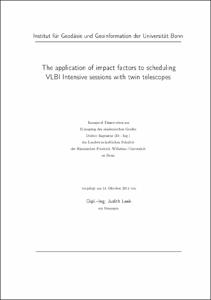Leek, Judith: The application of impact factors to scheduling VLBI Intensive sessions with twin telescopes. - Bonn, 2015. - Dissertation, Rheinische Friedrich-Wilhelms-Universität Bonn.
Online-Ausgabe in bonndoc: https://nbn-resolving.org/urn:nbn:de:hbz:5n-39059
Online-Ausgabe in bonndoc: https://nbn-resolving.org/urn:nbn:de:hbz:5n-39059
@phdthesis{handle:20.500.11811/6226,
urn: https://nbn-resolving.org/urn:nbn:de:hbz:5n-39059,
author = {{Judith Leek}},
title = {The application of impact factors to scheduling VLBI Intensive sessions with twin telescopes},
school = {Rheinische Friedrich-Wilhelms-Universität Bonn},
year = 2015,
month = feb,
note = {This thesis deals with the scheduling of special purpose, 1h-long VLBI sessions, so-called Intensives, and its further extension by twin radio telescopes. The daily VLBI Intensive measurements make an important contribution to the regular monitoring of Earth rotation variations. Since these variations are quite rapid their knowledge is important for navigation with GNSS and for investigations in Earth sciences. Unfortunately, the precision of VLBI Intensive observations is 2-3 times worse than the precision of regular 24h-VLBI measurements with networks of 5-10 radio telescopes. For economical and logistical reasons, these are performed only twice a week and have the disadvantage of a latency of the results of about ten days. However, for reliable predictions of the Earth’s rotation, the results have to be available as rapidly as possible.
For these reasons, the International VLBI Service for Geodesy and Astrometry (IVS) carries short duration (1h) sessions on a daily basis. The major task of research in this thesis is the improvement of VLBI Intensive results by using twin radio telescopes instead of single radio telescopes. Therefore, a new scheduling method for creating Intensive observing plans has been developed. With the aim of finding an appropriate method to schedule VLBI observations, preparatory investigations of Intensive sessions have been done using a regression diagnostics tool which is based on singular value decomposition of the design matrix and cluster analysis methods. These investigations suggest that the impact factors of the observations are well suited for the identification of the most influential observations which are needed for the determination of certain parameters within the entire design of a VLBI session. Thus, by using the impact factors of the observations as selection criteria, the developed scheduling method is designed for optimizing the observations’ geometry for a given network of radio telescopes and a predefined set of parameters to be estimated. The configuration of at least two twin telescopes, or one twin and two single telescopes, offers the possibility of building pairwise sub-nets that observe two different radio sources simultaneously. As a consequence, the number of viable observations within a session duration increased. In addition to an optimized observing plan, a special parametrization for twin telescopes leads to an improved determination of the Earth rotation variations, as it is shown by simulated observations in this thesis. In general, an improvement of about 50 percent in the formal errors can be realized by using twin radio telescopes.},
url = {https://hdl.handle.net/20.500.11811/6226}
}
urn: https://nbn-resolving.org/urn:nbn:de:hbz:5n-39059,
author = {{Judith Leek}},
title = {The application of impact factors to scheduling VLBI Intensive sessions with twin telescopes},
school = {Rheinische Friedrich-Wilhelms-Universität Bonn},
year = 2015,
month = feb,
note = {This thesis deals with the scheduling of special purpose, 1h-long VLBI sessions, so-called Intensives, and its further extension by twin radio telescopes. The daily VLBI Intensive measurements make an important contribution to the regular monitoring of Earth rotation variations. Since these variations are quite rapid their knowledge is important for navigation with GNSS and for investigations in Earth sciences. Unfortunately, the precision of VLBI Intensive observations is 2-3 times worse than the precision of regular 24h-VLBI measurements with networks of 5-10 radio telescopes. For economical and logistical reasons, these are performed only twice a week and have the disadvantage of a latency of the results of about ten days. However, for reliable predictions of the Earth’s rotation, the results have to be available as rapidly as possible.
For these reasons, the International VLBI Service for Geodesy and Astrometry (IVS) carries short duration (1h) sessions on a daily basis. The major task of research in this thesis is the improvement of VLBI Intensive results by using twin radio telescopes instead of single radio telescopes. Therefore, a new scheduling method for creating Intensive observing plans has been developed. With the aim of finding an appropriate method to schedule VLBI observations, preparatory investigations of Intensive sessions have been done using a regression diagnostics tool which is based on singular value decomposition of the design matrix and cluster analysis methods. These investigations suggest that the impact factors of the observations are well suited for the identification of the most influential observations which are needed for the determination of certain parameters within the entire design of a VLBI session. Thus, by using the impact factors of the observations as selection criteria, the developed scheduling method is designed for optimizing the observations’ geometry for a given network of radio telescopes and a predefined set of parameters to be estimated. The configuration of at least two twin telescopes, or one twin and two single telescopes, offers the possibility of building pairwise sub-nets that observe two different radio sources simultaneously. As a consequence, the number of viable observations within a session duration increased. In addition to an optimized observing plan, a special parametrization for twin telescopes leads to an improved determination of the Earth rotation variations, as it is shown by simulated observations in this thesis. In general, an improvement of about 50 percent in the formal errors can be realized by using twin radio telescopes.},
url = {https://hdl.handle.net/20.500.11811/6226}
}






